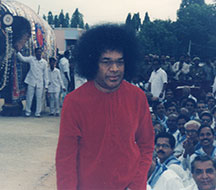
What is the meaning of word Guru
Puttaparthi, Sai Kulwanth Hall (Gurupoornima )
Description
What is the inner significance of the word “guru”? ““Gu”, “Ru”= “Gu”- gukaro andhakarasya, “ru”- rukaaro tannivaranaha”. ‘Guru’ is the one who dispels the darkness of ignorance. There is another connotation to the word ‘guru’: “Gu” –“gunaateethaha”, beyond the attributes; “ru”- “rooparahithaha”, formless. Brahma is the only one who is attribute-less and formless. So Brahma is the guru. Therefore the avatars did not teach anybody or give ‘Upadesh’ to anyone. Why does one require ‘Upadesha’ when one is in ‘swadesha’, in one’s own place? One is in Brahman, in Atma then why does one require ‘Upadesha’, teaching? It is those people who do not realise this truth that teach. There is a guru for the person who is teaching others. Therefore ‘guru’ is the person who does not have a ‘guru’ and that is God. It is therefore said, “Guru Brahma, gurur Vishnu, gururdevo Maheshwara, Gurur sakshaath parabrahma, Tasmai sri gurave namaha!” But in this modern day it is taught that Guru is Brahma, guru is Vishnu, and guru is Eshwara. But no, it is not true. These gurus are not Brahma, Vishnu or Maheshwara. So who is ‘guru’? Brahma is guru, Maheshwara is guru and Vishnu is guru; they represent the three attributes. Brahma represents the ‘Mantra’, the emotion. The pious ‘Sathwic’ nature is represented by Vishnu. Eshwara represents the ‘tamas’ the darkness. Therefore the whole world is made up of these three attributes. Every man has the three attributes. No one has seen the Brahma or Vishnu or Maheshwara. But they reside in every heart in the form of the three attributes. Leaving such an easy path and by following the unnecessary path, man wastes his precious life by getting carried away by the illusions and doubts. Then who is one’s guru? One is one’s own guru!! “Marmamerigina marunimisham lo manase vaadiki gurudandi”- the mind becomes one’s teacher the moment one knows the secret of life!! There is no guru beyond the mind!! The gurus today, confer some ‘Mantra’, teaching, to the disciple and get worshipped by them in return. Swami is not criticising anybody but is just stating the facts. The gurus whisper the Mantra in the ear and stretch hands to collect money. It is not an act befitting a guru. What is the meaning of ‘Gurudakshina’, offering to guru? Knowing thyself as guru is the true ‘Gurudakshina’!! Hence one is one’s own guru. One is verily the brahma and ‘Shakthi’ energy. Everything is found in oneself.
Topics
-Guru
-
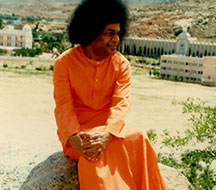
God is your true Guru
00:01:51Embodiments of love!! How happy and peaceful the whole world would be if everyone fostered pure, benevolent, sacred and divine thoughts!! One should not hate anybody. “Sarvabhoota tiraskaaram kesavam pratigachchathe” denying or rejecting another is like denying or rejecting God. Therefore, God alone is one’s guru. “Gurur guruhu” He is teacher of teachers. When one has steadfastness one does not suffer. “Korinaphalamichchu kalpavrukshambunda, Peratipushpamunakai preetiyela? Adigina paalichchu kaamadhenuvve yunda Dhanamichchi aavunu konaganela? Why aspire for the flower in the backyard when one has the wish fulfilling tree by his side? Why buy a cow when one has the “Kamadhenu’ the divine cow that yields milk at one’s mere asking? When man has the ‘Kalpavruksha’ the wish fulfilling tree, ‘Kamadhenu’ the celestial cow, then why beg others? All are children of God, parts of the same divine, the manifestation of divinity. Hence it is said in Geetha, “mamaivamso jeevaloke jeevabhootahsanatanaha”- all are the sparks of the divine and the eternal.
-
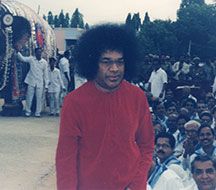
Who is a Rishi
00:00:57The word ‘Rishi’ relates to those people who had no delusions about the body but naturally exhibited the attachment to the atma and were immersed in peaceful and harmonious existence with a spirit of sacrifice and equality. The rishis were the ideal examples to others. For this reason, the ashrams where such people resided were called ‘Rishikul’.
-
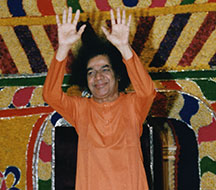
Swami on the compositions of Adi Shankara
00:04:56Sing the glory of Lord Govinda. Utter the name of Lord Govinda, Oh! you ignorant person! You should go on uttering the name of the Lord. It will not be possible for you to do so when death faces you and you are close to it. Reciting rules of grammar cannot save you. While the greatness of Shankara was evident in this verse itself, his disciples were also very scholarly persons and they wanted to satisfy their guru by exhibiting their abilities. Each one of the disciples then composed a verse, and altogether fourteen verses were composed at that time by the fourteen disciples. As soon as the fourteen disciples thus composed fourteen verses, Adi Shankara himself was pleased and gave expression to his pleasure by composing what has since come to be known as Dwadasa Manjari or the series of twelve verses. He then began thinking and came to the conclusion that teaching and preaching should be followed by some form of blessing by the guru in order that one may get full benefit and therefore gave four more verses in the form of blessing. In this manner, after having composed a total of thirty-one verses, the name of Moha Mudgara was given to those verses, and they were handed over to posterity as the Bhaja Govinda series.
-
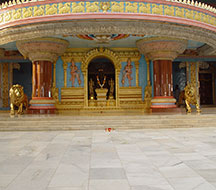
Adi Shankara says; Grammar cannot save you
00:07:00He devoted all the time that was available to him and all the energy that was in his body for the purpose of propagating the sacred Indian culture all over India. In the pursuit of this programme, he travelled all over India. During his travels, he lived in Benares for some time. His fourteen important disciples accompanied him. It was his daily routine to move about, along with his disciples, through the streets of Benares and to teach and preach his philosophy. He visited various houses of Brahmins in Benares and established the scriptural authorities for them. Shankara, during one such travels through the streets, noticed that in a house belonging to an old Brahmin, the owner of the house was reciting some rules of grammar. At that time Shankara entered the house, and he carried on a conversation with the Brahmin. Shankara asked the Brahmin to tell him what he expected to get by reciting the rules of grammar. The Brahmin replied that he had a big family, was unable to support such a big family and that he was acquiring some knowledge of grammar with which he hoped to go about and earn a little money to support his big family. Shankara then told the Brahmin all that was needed to be told and said that reciting rules of grammar will not help him. Shankara returned to his place and decided to put his advice in the form of a verse and that was what happened that day. The substance of the verse which Shankara then composed and began to sing along with his devotees, is as follows: Sing the glory of Lord Govinda. Utter the name of Lord Govinda, Oh! you ignorant person! You should go on uttering the name of the Lord. It will not be possible for you to do so when death faces you and you are close to it. Reciting rules of grammar cannot save you. While the greatness of Shankara was evident in this verse itself, his disciples were also very scholarly persons and they wanted to satisfy their guru by exhibiting their abilities. Each one of the disciples then composed a verse, and altogether fourteen verses were composed at that time by the fourteen disciples.
-
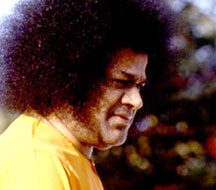
Early life of Sri Adi Shankaracharya
00:04:00More recently, in the year the name of which was Nandana, in the month the name of which was Vaishakhi, and on a day called Panchami, a Sunday, and in the early hours of the morning which we call Brahma Muhurtha, in a place called Kaladi, a village in Kerala, Shankaracharya took birth. At the early age of five years, Adi Shankara learnt the Gayatri Mantra. Having learnt the Gayatri Mantra and through its exposition, by the time he attained the age of fourteen years, he had learnt all the four. In this manner, he had the determination to spread the cult of spirituality throughout the world. Shankara was a great individual who, during his lifetime, wrote commentary on all the Upanishads in easily understandable language for the benefit of all people. He prepared the texts and his commentary acquired the name Shankara Bhashya. He devoted all the time that was available to him and all the energy that was in his body for the purpose of propagating the sacred Indian culture all over India. In the pursuit of this programme, he traveled all over India. During his travels, he lived in Benares (Kashi) for some time. His fourteen important disciples accompanied him. It was his daily routine to move about, along with his disciples, through the streets of Benares (Kashi) and to teach and preach his philosophy. He visited various houses of Brahmins in Benares and established the scriptural authorities for them.
-
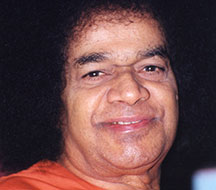
Adi Shankara came to establish Dharma
00:02:00Around 5800 years ago, when in this country, righteousness and all that was dependent upon dharma was on the decline, Adi Shankara appeared on the scene and propagated the ancient and Vedic dharma in the form of Advaitha or non-dual philosophy. He also established several well-known seats of learning all over India. The first signs of such decline in dharma were noticed as long ago as 5000 years. This was when Lord Krishna gave up his mortal coil.
-
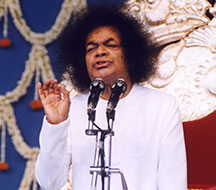
Teachings of ancient Gurus and disciples
00:03:41From time immemorial, this sacred land has had good traditions, had expounded many spiritual truths and is noted for the exceptionally good teacher-student relationship. A guru like Vashista and a disciple like Sri Ramachandra, a guru like Sandeepa and disciples like Krishna and Balarama, a guru like Dutta Govinda and a disciple like Adi Sankara, a guru like Suka Maharishi and a disciple like Parikshith created the sacred traditions of our country which have remained as shining examples to all from that day till today. The traditions have no parallel in any other part of the world. Where are we to find such teachers or such students in the present-day world? Alas! where is such relationship to be found today between the teacher and the taught? It is only when we accept the need and value of such a teacher-student relationship, with a full heart and a clean mind, that we can get the best out of our traditions relating to this matter. Modern youth should realize the truth in such a statement and for that purpose, it is essential that they understand correctly the relationship between man and man. Only then is it possible to understand the relationship between man and God, between creation and the creator, between Nara (man) and Narayana (God).
Topics
- Analogies
- Atma
- Attachment
- Balvikas
- Bhaja Govindam
- Bhajans
- Body
- Character
- Company
- Compassion
- Culture
- Day to day
- Desire
- Devotees
- Devotion
- Dharma
- Discipline
- Discrimination
- Doctors
- Education
- Faith
- Festivals
- Forbearance
- Gayathri
- God
- Gratitude
- Health and healthcare
- HIS Life
- Human values
- India
- Karma
- Love
- Mahabharata
- Man
- Meditation
- Mind
- Music
- Musicians
- Namasmarana
- Nature
- Parents
- Philosophical concepts
- Pleasure and Pain
- Practice
- Ramayana
- Religion
- Sacrifice
- Sadhana
- Sai Organization
- Saints
- Sathya
- Science
- Senses
- Service
- Sevadal
- Shanthi
- Shirdi Baba
- Society
- Spirituality
- Students
- Thoughts
- Time
- Unity
- Upanishad
- Vedas
- Vices
- Yoga
- Youth
